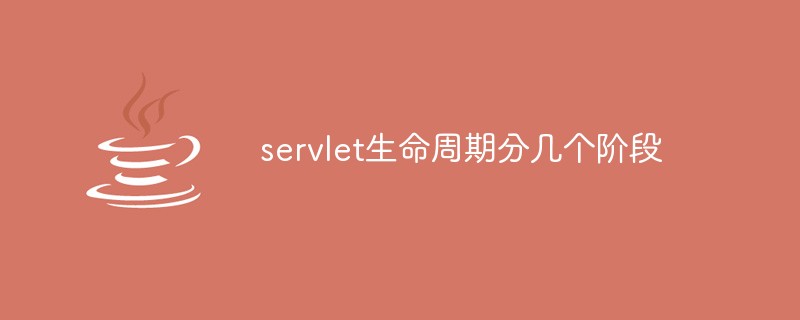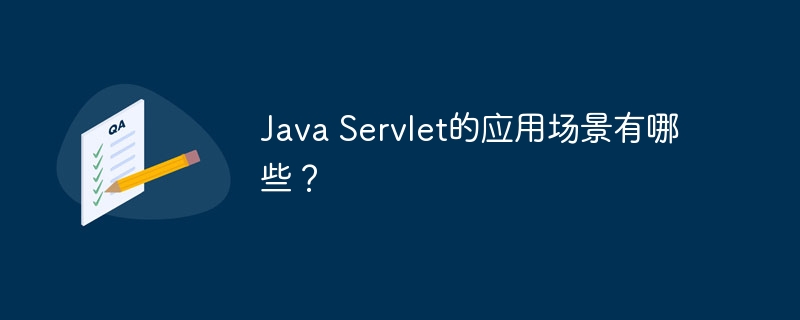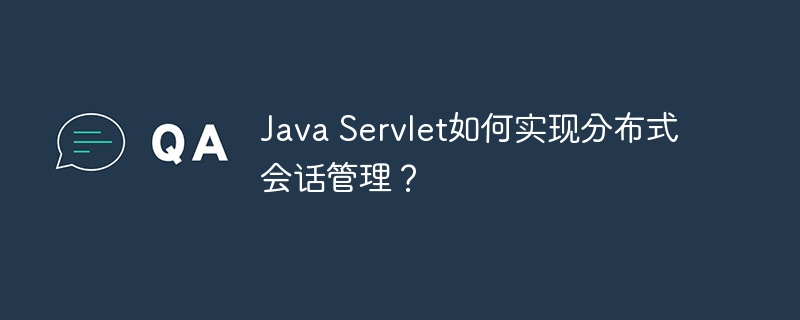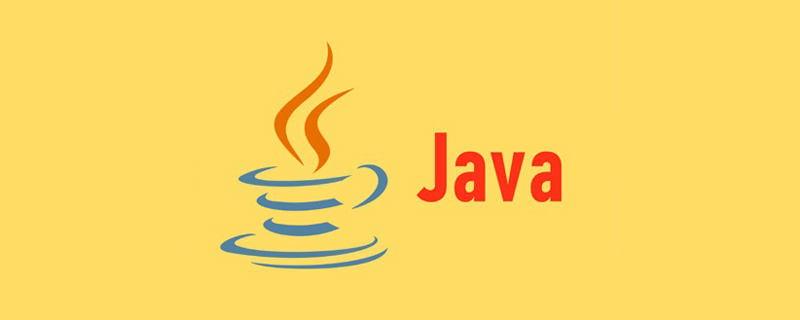Servlet life cycle methods: 1. init(); 2. contextInit(); 3. service(); 4. doGet(); 5. doPost(); 6. doPut(); 7. doDelete(); 8. doOptions(); 9. doHead(); 10. destroy(); 11. contextDestroyed(). Detailed introduction: 1. init(), this method is loaded when the Servlet is first loaded, etc.

The operating system for this tutorial: Windows 10 system, DELL G3 computer.
The life cycle of Servlet includes three phases: initialization phase, service phase and destruction phase. The following are the detailed methods of each stage:
1. Initialization stage:
init(): This method Called when the Servlet is first loaded into memory. Usually, some data is initialized, member variables are set, etc. in this method.
contextInit(): This method is called when the context of the web application is initialized. It allows the Servlet to access the initialization parameters of the web application, as well as the initialization of other resources used in the Servlet.
2. Service phase:
##service(): This method is for Servlet core. When the client sends a request, the service() method is called. Depending on the type of request (GET, POST, etc.), the service() method will call the corresponding method (such as doGet() or doPost()).
doGet(): This method handles HTTP GET requests.
doPost(): This method handles HTTP POST requests.
doPut(): This method handles HTTP PUT requests.
doDelete(): This method handles HTTP DELETE requests.
doOptions(): This method handles HTTP OPTIONS requests.
doHead(): This method handles HTTP HEAD requests.
3. Destruction phase:
- ##destroy():
This method is used by the Servlet Called before removing from memory. Typically, resources are released, database connections are closed, etc. in this method.
- contextDestroyed():
This method is called when the context of the web application is destroyed. It allows the Servlet to perform any necessary cleanup operations, such as closing threads or releasing resources.
Note: These methods are all part of the Servlet API, not all of these methods must be overridden in every Servlet, depending on the specific business requirements. For example, if the Servlet only handles GET requests, then you only need to override the doGet() method.
The above is the detailed content of What methods does the servlet life cycle include?. For more information, please follow other related articles on the PHP Chinese website!
 vue3改了几个生命周期函数Jan 13, 2023 pm 05:57 PM
vue3改了几个生命周期函数Jan 13, 2023 pm 05:57 PMvue3改了4个生命周期函数。Vue3组合式api取消了beforeCreated和created钩子函数,采用steup钩子代替,且里面不能使用this。Vue3里面的组件销毁的钩子函数由destroyed和beforeDestroy换成了beforeUnmount和unmounted。
 servlet生命周期分几个阶段Feb 23, 2023 pm 01:46 PM
servlet生命周期分几个阶段Feb 23, 2023 pm 01:46 PMServlet生命周期是指servlet从创建直到毁灭的整个过程,可分为3个阶段:1、初始化阶段,调用init()方法实现Servlet的初始化工作;2、运行阶段(处理请求),容器会为指定请求创建代表HTTP请求的ServletRequest对象和代表HTTP响应的ServletResponse对象,然后将它们作为参数传递给Servlet的service()方法;3、销毁阶段。
 Vue3中的生命周期函数:快速掌握Vue3的生命周期Jun 18, 2023 am 08:20 AM
Vue3中的生命周期函数:快速掌握Vue3的生命周期Jun 18, 2023 am 08:20 AMVue3是目前前端界最热门的框架之一,而Vue3的生命周期函数是Vue3中非常重要的一部分。Vue3的生命周期函数可以让我们实现在特定的时机触发特定的事件,增强了组件的高度可控性。本文将从Vue3的生命周期函数的基本概念、各个生命周期函数的作用和使用方法以及实现案例等方面进行详细探究和讲解,帮助读者快速掌握Vue3的生命周期函数。一、Vue3的生命周期函数的
 Java Servlet的应用场景有哪些?Apr 17, 2024 am 08:21 AM
Java Servlet的应用场景有哪些?Apr 17, 2024 am 08:21 AMJavaServlet可用于:1.动态内容生成;2.数据访问与处理;3.表单处理;4.文件上传;5.会话管理;6.过滤器。示例:创建一个FormSubmitServlet来处理表单提交,将name和email作为参数,并重定向到success.jsp。
 Java Servlet如何实现分布式会话管理?Apr 16, 2024 pm 02:48 PM
Java Servlet如何实现分布式会话管理?Apr 16, 2024 pm 02:48 PMJavaServlet中实现分布式会话管理的方法有两种:1.会话复制:将会话数据复制到各个服务器。2.会话分布:使用集中式存储服务存储会话数据,由多个服务器访问。具体实现方式有:会话复制配置web.xml文件中的true;会话分布使用Redis:引入jedis库,编写Servlet使用Jedis存储和检索会话数据;使用SpringSession:引入spring-session依赖,注入SessionRepository,通过它操作会话数据。
 Go语言中的变量作用域与生命周期Jun 01, 2023 pm 12:31 PM
Go语言中的变量作用域与生命周期Jun 01, 2023 pm 12:31 PMGo语言是一种开源的静态类型语言,它具有简洁、高效、可靠等特点,越来越受到开发者的喜爱。在Go语言中,变量是程序中最基本的数据存储形式,变量的作用域和生命周期对于程序的正确性和效率十分重要。变量的作用域指的是变量的可见性和可访问性,即在何处可以访问这个变量。在Go语言中,变量的作用域分为全局变量和局部变量。全局变量是定义在函数外部的变量,它可以被整个程序任何
 什么是servletJan 28, 2023 am 09:51 AM
什么是servletJan 28, 2023 am 09:51 AMServlet全称“Java Servlet”,中文意思为小服务程序或服务连接器,是运行在Web服务器或应用服务器上的程序,它是作为来自Web浏览器或其他HTTP客户端的请求和HTTP服务器上的数据库或应用程序之间的中间层。Servlet具有独立于平台和协议的特性,主要功能在于交互式地浏览和生成数据,生成动态Web内容。
 解释C语言中变量的生命周期Sep 02, 2023 pm 07:37 PM
解释C语言中变量的生命周期Sep 02, 2023 pm 07:37 PM存储类指定变量的范围、生命周期和绑定。要完整定义变量,不仅需要提及其“类型”,还需要提及其存储类。变量名称标识计算机内存中的某个物理位置,其中分配了一组位来存储变量的值。存储类别告诉我们以下因素-变量存储在哪里(内存或CPU寄存器中)?如果没有初始化,变量的初始值是多少?变量的作用域是什么(可以访问变量的范围)?变量的生命周期是多长?生命周期变量的生命周期定义了计算机为其分配内存的持续时间(内存分配和释放之间的持续时间)。在C语言中,变量可以具有自动、静态或动态生命周期。自动-创建具有自动生命周


Hot AI Tools

Undresser.AI Undress
AI-powered app for creating realistic nude photos

AI Clothes Remover
Online AI tool for removing clothes from photos.

Undress AI Tool
Undress images for free

Clothoff.io
AI clothes remover

AI Hentai Generator
Generate AI Hentai for free.

Hot Article

Hot Tools

SublimeText3 English version
Recommended: Win version, supports code prompts!

Safe Exam Browser
Safe Exam Browser is a secure browser environment for taking online exams securely. This software turns any computer into a secure workstation. It controls access to any utility and prevents students from using unauthorized resources.

Zend Studio 13.0.1
Powerful PHP integrated development environment

DVWA
Damn Vulnerable Web App (DVWA) is a PHP/MySQL web application that is very vulnerable. Its main goals are to be an aid for security professionals to test their skills and tools in a legal environment, to help web developers better understand the process of securing web applications, and to help teachers/students teach/learn in a classroom environment Web application security. The goal of DVWA is to practice some of the most common web vulnerabilities through a simple and straightforward interface, with varying degrees of difficulty. Please note that this software

mPDF
mPDF is a PHP library that can generate PDF files from UTF-8 encoded HTML. The original author, Ian Back, wrote mPDF to output PDF files "on the fly" from his website and handle different languages. It is slower than original scripts like HTML2FPDF and produces larger files when using Unicode fonts, but supports CSS styles etc. and has a lot of enhancements. Supports almost all languages, including RTL (Arabic and Hebrew) and CJK (Chinese, Japanese and Korean). Supports nested block-level elements (such as P, DIV),






